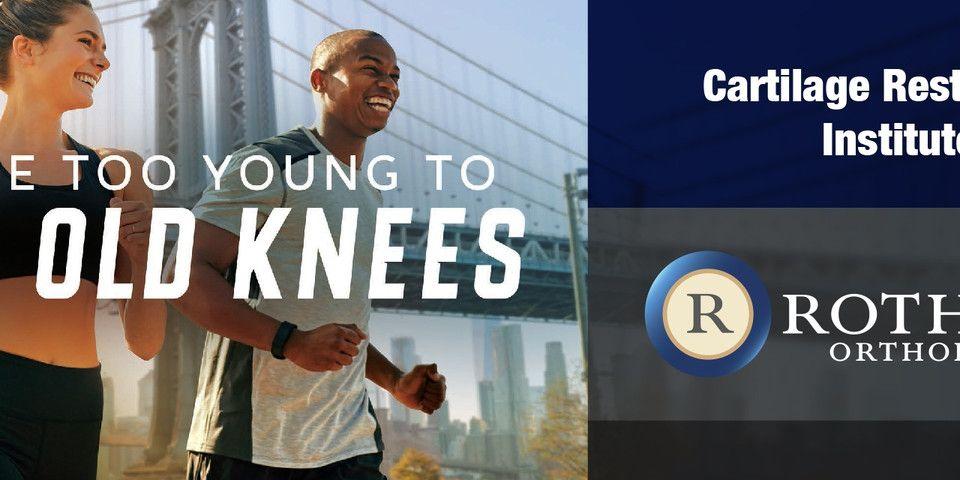Return to Your Active Lifestyle with Knee Cartilage Restoration
Arthritis Keeping You Stagnant? Get Moving Again with Cartilage Restoration
A diagnosis of knee arthritis does not have to slow you down, especially for younger active people.
Orthopaedic doctors, like those at Rothman Orthopaedic Institute, now have advanced surgical methods to address arthritis pain and symptoms at the source, so patients can maintain their active lifestyles. Interested in pursuing knee cartilage treatment? Do you need a professional to repair the damaged cartilage in the knee without undergoing a replacement procedure?
Learn about your care options at Rothman Orthopaedic Institute in North Jersey. Our Sports Medicine specialists can evaluate the conditions of active adults and determine whether or not they could benefit from cartilage restoration treatment. Below, we share the basic information you need to know about cartilage damage, the treatment process, and recovery.
Knee Cartilage Damage: Cause and Symptoms
Perhaps you are thinking, “I’m too young to have arthritis!” The truth is that people of any age can develop arthritis, and there are over 100 different kinds. The most common type, osteoarthritis, is typically seen in older patients, which may lead to the assumption that only older adults receive these diagnoses. The next two most common arthritis forms are rheumatoid and arthritis caused by traumatic injury to a joint. These two, among other types, are more likely to be seen in younger adult patients.
Regardless of what type of arthritis you were diagnosed with, you may have some cartilage damage that is in need of repair. How can you tell for sure? Some symptoms of knee cartilage damage include pain and inability to fully move the knee. You may also notice a physical deformity or feel inflammation. Only the diagnosis of an orthopaedic specialist can confirm the extent of the damage.
Repair Damaged Cartilage in the Knee With Knee Cartilage Regeneration
Damaged cartilage cannot repair itself. However, knee cartilage restoration helps patients regain mobility by resurfacing and stabilizing the joint. Two of the most common cartilage restoration processes that are performed by our Rothman Orthopaedic Institute specialists are:
-
Autologous Chondrocyte Implantation (ACI): This process has two steps. To begin, a knee doctor will remove healthy cartilage from an area in the joint that will not harm the patient. The doctor will then send the cartilage collection to a laboratory, where the cells are cultured and can multiply over three to five weeks. The second step involves the reinsertion of the new cells. The doctor will add a layer of bone-lining tissue, then inject the cartilage cells beneath the cover.
-
Osteochondral Transplant: An osteochondral transplant may either include an autograft or allograft. In autograft transplantation, healthy cartilage from one joint in the body is transferred to the damaged area. Osteochondral autograft is typically suggested for smaller cartilage injuries because the procedure is done with an arthroscope.
For larger areas of damage, an allograft from a cadaver is used. Doctors suggest this type of osteochondral transplant after another restoration technique has failed to provide relief or if bone damage is present, in addition to cartilage damage.
Regardless of the type of knee cartilage surgery, all patients must participate in a rehabilitation process after treatment. Directly following your cartilage restoration procedure, you may need to use crutches to avoid bearing weight on the affected knee joint. Within the first couple of weeks post surgery, your orthopaedic specialist will recommend passive motion therapy that enables controlled movement. Later, you will most likely enter a physical therapy program focused on strengthening the joint.
For patients who play sports or love to exercise, knee cartilage restoration may be the treatment option you’ve been looking for. To know for certain, seek an examination from a Sports Medicine expert at Rothman Orthopaedic Institute. To learn more about how our doctors repair damaged cartilage in the knee, or to schedule an appointment, please visit us here or contact us at 1-800-321-9999.
Locations
Related Specialties
Related Treatments
Related Programs
-

Cartilage Restoration Institute
This is a center where patients can go to have their disabled joint biological resurfaced, realigned, and stabilized without having the joint replaced by artificial materials such as metal and plastic. It is well known that the outcomes of patients under the age of 50 undergoing artificial joint replacement are not as good as we would like. Therefore we feel the future of Orthopaedics is to try to restore a joint back to its original anatomy by realignment, ligament reconstruction, and cartilage restoration.Read More




